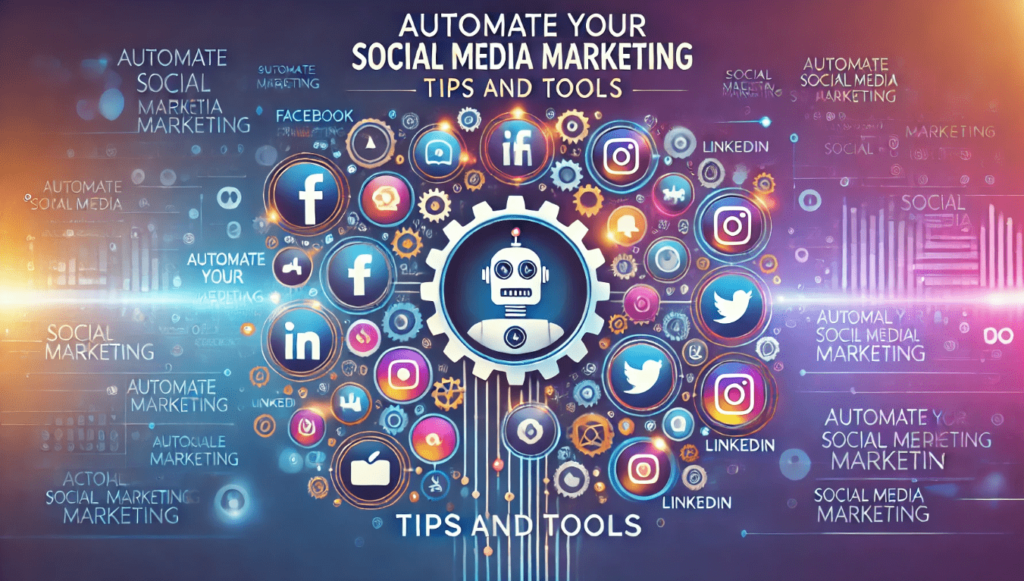In the fast-paced world of social media, staying on top of your game can feel like a never-ending task. Posting regularly, engaging with followers, analyzing performance – it can be overwhelming. But what if you could automate much of this work? Here’s how to make your social media marketing more efficient and effective with automation.
Why Automate Your Social Media Marketing?
Before diving into the how, let’s understand the why. Automating your social media marketing can save you time, ensure consistent posting, help you maintain a strong online presence, and allow you to focus on creating high-quality content and engaging with your audience.
1. Content Scheduling Tools
One of the most straightforward aspects to automate is content scheduling. Tools like Hootsuite, Buffer, and Later allow you to plan and schedule your posts in advance. This means you can batch create your content and then set it to post automatically at optimal times. No more scrambling to write a post every day.
Tips for Effective Scheduling:
- Know Your Audience: Use analytics to determine when your audience is most active.
- Plan Ahead: Create a content calendar to ensure a mix of promotional, educational, and engaging content.
- Be Consistent: Regular posting keeps your audience engaged and informed.
2. Social Media Management Platforms
Beyond scheduling, comprehensive social media management platforms like Sprout Social and Agorapulse offer features like social listening, analytics, and even automated engagement.
Key Features:
- Social Listening: Monitor mentions of your brand or relevant keywords to stay on top of trends and customer sentiment.
- Automated Responses: Set up automated replies for common inquiries or during off-hours to ensure your audience always gets a timely response.
- Analytics: Gain insights into your social media performance to refine your strategy.
3. Content Creation Tools
Creating high-quality content consistently can be a challenge. Tools like Canva, Animoto, and Lumen5 can help you produce professional-looking graphics and videos quickly. These tools often come with templates and easy-to-use interfaces that make content creation a breeze.
Tips for Using Content Creation Tools:
- Use Templates: Start with templates to speed up the creation process and maintain a consistent look.
- Repurpose Content: Turn blog posts into infographics, videos, or social media posts to maximize your content’s reach.
- Stay On-Brand: Use your brand colors, fonts, and style in all your content to maintain a cohesive look.
4. Automating Engagement
Engagement is a crucial part of social media marketing, but it can also be time-consuming. Tools like ManyChat and Chatfuel allow you to create chatbots for platforms like Facebook Messenger, enabling you to automate interactions with your audience.
Benefits of Chatbots:
- Instant Responses: Provide immediate answers to common questions, improving customer satisfaction.
- Lead Generation: Use bots to capture leads by offering valuable resources or discounts in exchange for contact information.
- 24/7 Availability: Engage with your audience around the clock without needing to be online yourself.
5. Analytics and Reporting Tools
Understanding the impact of your social media efforts is essential for continuous improvement. Tools like Google Analytics, Socialbakers, and Brandwatch provide in-depth analytics and reporting features.
Using Analytics Effectively:
- Track Key Metrics: Focus on metrics that align with your goals, such as engagement rates, click-through rates, and conversions.
- Identify Trends: Look for patterns in your data to understand what content resonates most with your audience.
- Refine Your Strategy: Use insights from your analytics to make data-driven decisions and improve your social media strategy.
6. Automating Ads Management
Running social media ads can be a great way to reach a larger audience, but managing these ads can be complex. Platforms like AdEspresso and Qwaya can help you automate and optimize your social media advertising campaigns.
Advantages of Automated Ads Management:
- Split Testing: Automatically run A/B tests to see which ads perform best.
- Budget Optimization: Automatically allocate your budget to the best-performing ads to maximize ROI.
- Detailed Reporting: Get in-depth reports to understand ad performance and make informed decisions.
7. Influencer Marketing Platforms
Collaborating with influencers can amplify your reach and credibility. Tools like AspireIQ and Upfluence help you find and manage relationships with influencers, automating much of the process.
Tips for Using Influencer Platforms:
- Find the Right Influencers: Use these platforms to identify influencers whose audience aligns with your target market.
- Track Campaign Performance: Monitor the performance of your influencer campaigns to measure ROI.
- Maintain Relationships: Automate communication and payment processes to keep your influencer partnerships running smoothly.
8. Social Media Listening Tools
Understanding what people are saying about your brand and industry can provide valuable insights. Tools like Mention, Brand24, and Talkwalker allow you to monitor social media conversations and respond accordingly.
Benefits of Social Media Listening:
- Reputation Management: Quickly address negative comments or reviews to protect your brand’s reputation.
- Trend Analysis: Identify emerging trends and capitalize on them before your competitors do.
- Customer Insights: Gain a deeper understanding of your audience’s needs and preferences.
Conclusion
Automating your social media marketing isn’t about replacing the human touch; it’s about enhancing it. By leveraging the right tools, you can streamline your processes, save time, and focus on what really matters – creating engaging content and building relationships with your audience. Start small, test different tools, and see what works best for your business. With the right automation strategy, you’ll be able to take your social media marketing to new heights.

